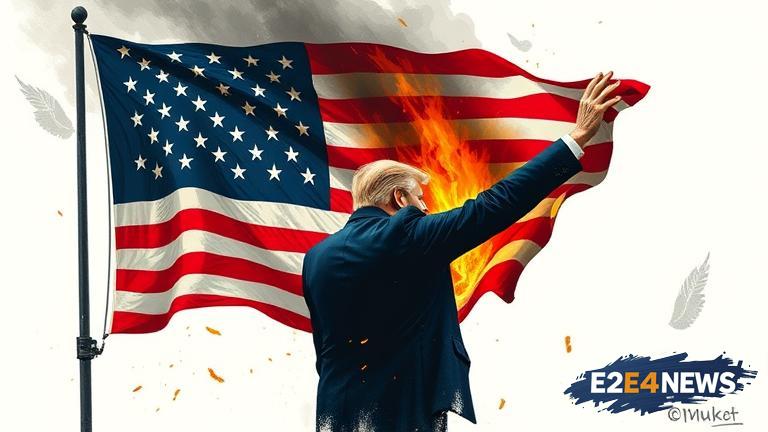The recent proposal by President Trump to ban flag burning has ignited a fierce debate across the United States, with proponents arguing it’s a necessary measure to protect national symbols and opponents claiming it’s a blatant attempt to suppress free speech. The issue has been a longstanding point of contention, with the Supreme Court previously ruling that flag burning is a form of protected speech under the First Amendment. However, Trump’s administration has taken a hardline stance, with the President himself tweeting that those who burn the flag should face severe penalties, including jail time. The move has been met with widespread criticism from civil liberties groups, who argue that it’s a thinly veiled attempt to stifle dissent and undermine the principles of democracy. On the other hand, supporters of the ban claim that it’s essential to maintain respect for the national flag and the values it represents. The controversy has also sparked a broader discussion about the limits of free speech and the role of government in regulating expression. While some argue that flag burning is a form of hate speech that should be prohibited, others contend that it’s a legitimate form of protest and a fundamental right. The Supreme Court has previously addressed the issue in the landmark case of Texas v. Johnson, which ruled that flag burning is a form of symbolic speech protected by the First Amendment. Despite this, Trump’s administration has signaled its intention to revisit the issue, potentially paving the way for new legislation or even a constitutional amendment. The move has been met with skepticism from legal experts, who argue that any attempt to ban flag burning would be unlikely to succeed in the courts. Nevertheless, the controversy has highlighted the deep divisions within American society, with some hailing the proposal as a necessary measure to protect national pride and others condemning it as a threat to fundamental freedoms. As the debate continues to unfold, it remains to be seen whether Trump’s proposal will gain traction or ultimately fizzle out. One thing is certain, however: the issue has struck a chord with the American public, with many taking to social media to express their opinions and engage in heated debates. The controversy has also raised questions about the limits of presidential power and the role of the executive branch in shaping the national conversation. While Trump’s supporters argue that he’s simply trying to protect American values, his critics contend that he’s overstepping his authority and undermining the principles of democracy. The issue has also sparked a reaction from lawmakers, with some introducing legislation to ban flag burning and others condemning the proposal as unconstitutional. As the debate rages on, it’s clear that the issue of flag burning has become a lightning rod for broader discussions about free speech, patriotism, and the role of government in regulating expression. The controversy has also highlighted the importance of civic engagement and the need for Americans to participate in the democratic process. Ultimately, the fate of Trump’s proposal remains uncertain, but one thing is clear: the debate over flag burning has ignited a national conversation about the values and principles that underpin American society. The issue has also sparked a reaction from international observers, who are watching the controversy with interest and concern. As the world waits to see how the debate will unfold, it’s clear that the issue of flag burning has become a major flashpoint in American politics. The controversy has also raised questions about the impact of social media on the national conversation, with many arguing that platforms like Twitter and Facebook have amplified the debate and contributed to the polarization of American society. Despite the challenges, many remain optimistic that the debate over flag burning will ultimately lead to a more nuanced understanding of the issues at stake and a deeper appreciation for the complexities of American democracy.
